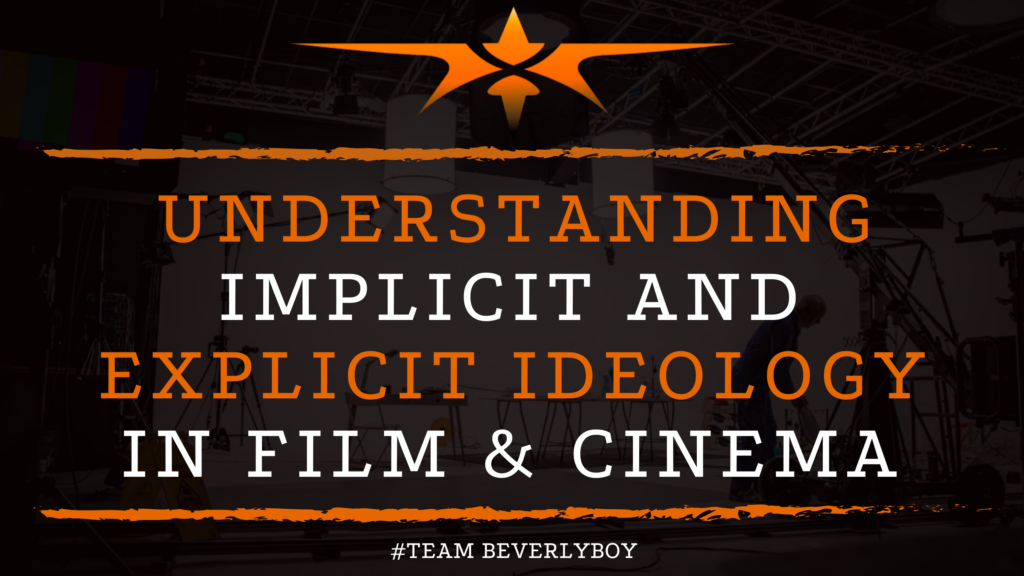Understanding Implicit and Explicit Ideology in Film & Cinema
Various assumptions are made in examining a film’s ideology particularly in regards to what a film is attempting to convey either implicitly or explicitly. When it comes to studying implicit and explicit ideology in film and cinema there’s a lot to be learned based on deep interpretation of underlying religious, moral or political meanings within a film. Determining the nature of implicit and explicit ideology in film is certainly an art that many aspiring filmmakers acquire over time, but what does all of this mean?

WHAT ARE IDEOLOGIES IN FILM?
In order to fully examine the nature of implicit and explicit ideologies in film we first must address the definition of film ideologies. An ideology represents a system of underlying ideas or ideals representative of society or a group.
Oftentimes, ideologies refer to politics, economics, or religion. Within the ideologies of film are implicit and explicit ideologies.
OVER TIME
Over the years, ideologies have been characterized in slightly different manners. Depending on the theorists or individuals that are addressing them. According to Karl Marx, ideologies are characterized as the ideas of the ruling class.
However, one can define ideologies as the perception or otherwise acceptable cultural objects. That operates fundamentally on people through a process that is not understood.
In other words, ideologies are accepted beliefs or situations for a group of people. Regardless of understanding as to how the beliefs came about.
WORLD VIEW
Ideologies in film represent a governing body of ideas which reflect the social needs of a group, class, culture or individual. Sometimes referred to as a “world view”.
These unquestioned ideas represent a belief system in which the good overrides the bad and, despite disagreements or areas of concern, we go along with the ideologies and accept the imposed controls without question.
WHAT ARE IMPLICIT IDEOLOGIES IN FILM?
Implicit ideologies in film represent implied and subtle instruction or connections to societal norms. Through implicit ideology, the filmmaker will use subtle nuances and hints for the viewer with the expectation that they will ultimately understand the message.
Largely because it’s the “norm” or the world view anyway. Films express ideology through implied messages rather than through outright delivery.
CONFLICTING VALUES
It’s common for implicit ideologies in film to take place in situations where the protagonist and antagonist represent conflicting ideologies. There is representation of conflicting values between the two sides but they are not the focus.
Films with implicit ideologies have a message that is particularly leaning in one direction. These views are accepted as “just how things work” or “just the way it is.”
These portray the dominant class view and represent dominant morals or intellectual codes which serve the majority. The film Pretty Woman produced in 1990 is representative of implicit ideologies in film.
WHAT ARE EXPLICIT IDEOLOGIES IN FILM?’
Explicit ideologies in film represent films in which the ideology is states outright. Despite any underlying knowledge that what the filmmaker is stating is certainly not the “world view” or most widely accepted ideology.
Explicit ideological films outright state the message without regard to concern for what the masses may “feel.” The filmmaker wants to change the world view or negate a particular “norm”.
Thus they produce the film with a very clear message of expressing the ideology so that the audience knows exactly what the message is.
PERSUASION
It’s common for explicit ideologies in film to be found in situations where the goal is to persuade the audience into thinking in a particular way. Films that utilize explicit ideologies are produced to persuade the other side. Or perhaps to teach a particular viewpoint or idea.
They are certainly not approaching the “greater good” or representing the world views of the dominant class. But rather attempting to change an otherwise accepted view by educating or persuading an entirely different view.
While there are far fewer instances in which a film would fall into the explicit ideology category they do exist. Most films have implicit ideologies. But a few with explicit ideologies come to mind.
Such as The Green Berets and Paths of Glory. Both of these films represent antiwar which would be largely against the ideologies of the masses, especially for their time and based on the subject matter.
DIFFERENCE BETWEEN IMPLICIT AND EXPLICIT IDEOLOGY IN FILM

The differences between implicit and explicit ideology in film is really not hard to understand. Implicit ideologies representing the implied norms that society accepts which have loose and subtle applications in film.
Through implicit actions and underlying values or beliefs that the story integrates. Explicit ideologies in film do not appeal to the masses. They focus more on the “other side”. And the film explicitly states so.
There are a variety of different ways to use implicit and explicit ideology in film. And one can often find in films that are representative of political standings. In fact, whether a film is political or not, there are often both implicit and explicit ideologies in a film.
Which have deep connections to the ideologies of society whether implicit or explicit.
PARODY
Parodies often use ideologies as a means of various implicit ideologies implying different underlying meanings or causes. Likewise, we see explicit ideologies play out in films that are controversial and not largely accepted by mass audiences.
Certainly with the accepted versus largely unaccepted norms of society. It’s understood that there are more implicit ideologies in films than there are explicit ideologies.
However it’s quite common to see explicit ideologies come out in independent filmmaking as is the norm for many film festivals.
IN SUMMARY
The use of implicit and explicit ideology in film is certainly one of the many ways that filmmakers are able to use the perceived values, cultures, and underlying “norms” of society to appeal to audiences.
While creating powerful emotional responses both good and bad. What kind of implicit and explicit ideology in film has caught your attention in the past?

